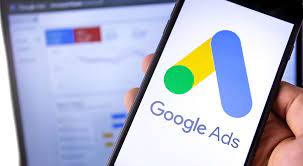Marketing involves reaching potential customers. Which approach is better to contact them than advertising on the most popular search engine? Google Ads, together with Google Analytics and Google Trends, is a powerful internet advertising tool.
Businesses may target Google searchers with Google Ads. Google Ads can bring you a broad audience of product or service seekers. If you don't use Google Ads, learn about this powerful marketing tool.
What is Google Ads?
Most Google searches with an ad for a company's landing page are the
first (or second, or third) result result of a Google Ads campaign.
You pay Google Ads (previously Google AdWords) to show your company ad
to customers searching for relevant terms on Google Search and Maps. Google Ads
is essential for businesses seeking to reach their target audience with
relevant ad material.
You only pay for website clicks and business calls using Google Ads. Pay-per-click (PPC) campaigns use this structure. Google will automatically follow your monthly Google Ads campaign ad-spend cap, and you can target global or local audiences.
Why use Google Ads?
Here are some Google Ads perks for digital marketing.
1. Boosts leads and customers.
Regarding producing leads, Google Ads is the most effective technique
available. Providing that your campaigns are correctly configured, they can
direct highly targeted leads to your website, opt-in form, or any other online
property.
Google Ads lets you target customers who are looking for your business. Using this platform, you may constantly adjust your searches to send only buyers to your websites.
2. It offers flexible marketing options.
Regular Google Ads users say it's a flexible marketing tool. It works
for all sizes of companies. This mechanism turns internet traffic on and off.
Many additional marketing platforms and software solutions are compatible with
it.
You may effortlessly target certain web users with campaigns.
Set your marketing budget for specific areas. You could control your keyword click spending by setting daily budgets and limits.
3. ROI is high.
Google Ads only charges for clicks, unlike other marketing methods.
Optimizing Google Ads campaigns can yield a high ROI, unlike other marketing
tactics.
This takes time, and you must choose which technique works for your
firm. Continuously testing and tracking your advertisements can help you
determine what works best. Google Ads is ideal because it's straightforward and
provides all the necessary information.
Focus your efforts and budget on campaign regions with a solid ROI. Discard campaigns or elements of campaigns that waste money. Use your savings for successful and future campaigns.
4. Results are swift and straightforward.
Google Ads provides rapid, simple campaign outcomes and reports.
The dashboard displays all campaign data, including ads clicked,
keywords entered by website visitors, and click costs, making it easy to track
campaign progress.
These features make Google Ads very clear and straightforward.
5. It gets massive, high-quality traffic.
Google's market dominance and enormous customer base allow it to send
businesses a lot of daily traffic if they can afford it.
Google strives to show relevant content and adverts and constantly
improves its search engine algorithms. This benefits Google advertisements
advertisers because these advertisements provide:
- High-quality
leads and visits to their websites.
- E-commerce
stores.
- Opt-in
forms.
- Other
online assets.
Google referrals are more likely to become clients, opt into your email list, seek information, or do other desired actions.
6. Learn about your market.
You must understand your ideal clientele. Knowing your audience helps
you deal with clients and discover their needs leisurely.
However, this is tough. Traditional procedures like questionnaires and
interviews yield little.
However, Google Ads provides client habits and needs data that prior
business owners could only dream of. Google Ads shows your consumers' location,
devices, keywords, search times, and days.
This information can help you enhance your products and services and
adjust your marketing to save money on uninterested customers.
Google Ads is a vital advertising tool. It handles millions of internet
queries daily and gives business owners a unique chance to turn many of them
into leads and consumers.
The cost of Google Ads advertising deters many businesses, especially those needing experience with the platform. However, clever online advertising can provide significant Google Ads rewards.
How does Google Ads work?
You may question how it works now that you know about Google Ads. You'll
inform Google which of these three goals you want to achieve before starting a
Google ad spend:
• Boost business calls
• Draw more customers to your store
• Visitors should be sent to your website or landing page directly. Choose whether your ad copy will be delivered globally or locally. Next, use photos or three lines to explain to Google what makes your business unique, and Google will help you write your ad copy. Google will use your budget to forecast the effectiveness of your Google Ads campaign, and Google will launch your ad. As more individuals click on your PPC campaign advertising, your firm will get closer to meeting its budget.
The five Google Ads kinds
The above procedures apply to all Google Ads campaigns. While no two
Google Ads campaigns are the same, there are five types:
• Search Network campaign: Get your ad on Google Search, Maps, and
hundreds of additional search partners, such as YouTube and Google Shopping.
Users searching for keywords connected to your campaign will see your ad on any
of these sites.
• Display Network campaign: Target users of Google Display Network
products like Gmail and YouTube with visual adverts.
• Shopping campaign: Google uses product data from your website, rather
than a user's keyword, to determine ad placement in Google Shopping.
• Video campaign: Promote your business by posting a video advertisement on YouTube and other domains of the Google Display Network.
• App campaign: Display advertising on Google Search, YouTube, Play,
AdMob, Display Network, Discover, search partners, and other publishers.



0 Comments